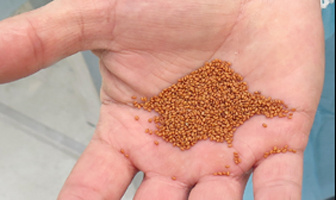Lipid Droplet Biotechnology in Plants for the Production of Viral Membrane Proteins: Application to SARS-CoV-2 E and M Proteins
lipid droplet
SARS-CoV-2
molecular agriculture
plant biotechnology
partnership research
Publication from the DIPOL team in a collaboration, in the Biotechnology journal, November 2023
Plants have been successfully used as platforms for the expression of recombinant proteins. They can be cultivated on a large scale and are free from human and animal pathogens. Plants have been utilized for the production of proteins aimed at fundamental research as well as for high-value biopharmaceutical products. Lipid droplets (LDs), which contain oil in seeds, have been successfully used as a biotechnological platform to anchor and purify recombinant proteins by exploiting flotation fractionation. Additionally, seeds are capable of storing recombinant proteins for years at room temperature since they naturally accumulate very high levels of proteins, have low protease activity, and contain little water. Until now, only soluble proteins have been produced by anchoring to LDs via oleosins, the structural proteins of LDs. The highly hydrophobic nature of LDs led us to hypothesize that LDs could also be used to stabilize and accumulate membrane proteins, either directly or through fusion with oleosins. This hypothesis was thus tested with E and M, two integral membrane proteins of SARS-CoV-2, which are genetically more stable than the S protein, and therefore of interest in immunization strategies.
In a research collaboration between the "Design, Engineering, Compartmentalization of Lipid Metabolism" DIPOL team and Core Biogenesis, a startup founded by a former Post-Doc of the the Institute Jean-Pierre Bourgin for Plant Sciences, a set of molecular biotechnology tools and biological chassis* (Nicotiana benthamiana leaves and Camelina sativa seeds) were developed for the expression of hydrophobic recombinant proteins, which are particularly challenging to produce in heterologous systems. These tools allow the rapid combinatorial association of different coding parts (target proteins, tags, targeting anchors, linkers) with promoters and terminators in plants. These recombinant proteins are of increased interest for the production of low-variability viral antigens in the context of establishing effective, rapid, and cost-efficient therapeutic responses. Targeting these proteins to a lipid-rich environment, the lipid droplet, allows their stabilization and facilitates purification by flotation. Small-scale production of lipid droplets from Camelina sativa seeds containing the hydrophobic SARS-CoV-2 antigens E and M was carried out by the team, with a calculated theoretical yield of 80 to 540 mg/kg of seeds.
The results obtained show that the nature of the tags, linkers, and their relative positions in the recombinant protein can modify the protein's subcellular distribution and stability. Association with AtOLE1 oleosin improves the targeting of E and M proteins to LDs. Moreover, plant oleosin can be used to effectively address and stabilize viral membrane proteins on LDs.
The DIPOL team is currently focused on optimizing a set of platforms for the production of recombinant hydrophobic proteins associated with LDs to address the research and production challenges for pharmaceutical applications, such as transdermal or oral vectorization. Particular attention is given to hydrophobic viral antigens from emerging diseases and zoonoses in collaboration with the "Virology and Molecular Immunology" VIM unit and the SOLEIL synchrotron.
*Living organisms used for synthetic biology.
Research developed at the Institute Jean-Pierre Bourgin for Plant Sciencess in collaboration.
In a research collaboration between the "Design, Engineering, Compartmentalization of Lipid Metabolism" DIPOL team and Core Biogenesis, a startup founded by a former Post-Doc of the the Institute Jean-Pierre Bourgin for Plant Sciences, a set of molecular biotechnology tools and biological chassis* (Nicotiana benthamiana leaves and Camelina sativa seeds) were developed for the expression of hydrophobic recombinant proteins, which are particularly challenging to produce in heterologous systems. These tools allow the rapid combinatorial association of different coding parts (target proteins, tags, targeting anchors, linkers) with promoters and terminators in plants. These recombinant proteins are of increased interest for the production of low-variability viral antigens in the context of establishing effective, rapid, and cost-efficient therapeutic responses. Targeting these proteins to a lipid-rich environment, the lipid droplet, allows their stabilization and facilitates purification by flotation. Small-scale production of lipid droplets from Camelina sativa seeds containing the hydrophobic SARS-CoV-2 antigens E and M was carried out by the team, with a calculated theoretical yield of 80 to 540 mg/kg of seeds.
The results obtained show that the nature of the tags, linkers, and their relative positions in the recombinant protein can modify the protein's subcellular distribution and stability. Association with AtOLE1 oleosin improves the targeting of E and M proteins to LDs. Moreover, plant oleosin can be used to effectively address and stabilize viral membrane proteins on LDs.
The DIPOL team is currently focused on optimizing a set of platforms for the production of recombinant hydrophobic proteins associated with LDs to address the research and production challenges for pharmaceutical applications, such as transdermal or oral vectorization. Particular attention is given to hydrophobic viral antigens from emerging diseases and zoonoses in collaboration with the "Virology and Molecular Immunology" VIM unit and the SOLEIL synchrotron.
*Living organisms used for synthetic biology.
Research developed at the Institute Jean-Pierre Bourgin for Plant Sciencess in collaboration.
Back

Légend: Cameline seeds arvested in IJPB greenhouse
Highlight IJPB
Référence:
L Gissot, F Fontaine, Z Kelemen, O Dao, I Bouchez, C Deruyffelaere, M Winkler, A Da Costa, F Pierre, C Meziadi, JD Faure, M Froissard (2023). E and M SARS-CoV-2 membrane protein expression and enrichment with plant lipid droplets, Biotechnology journal
doi: https://doi.org/10.1002/biot.202300512
Contact: Marine Froissard,contact
IJPB Team:
"Design, Engineering, Compartmentalization of Lipid Metabolism" DIPOL